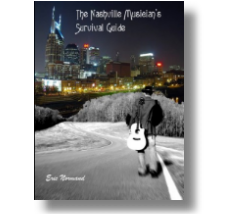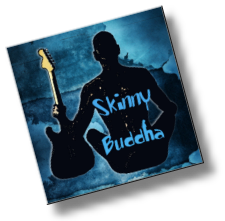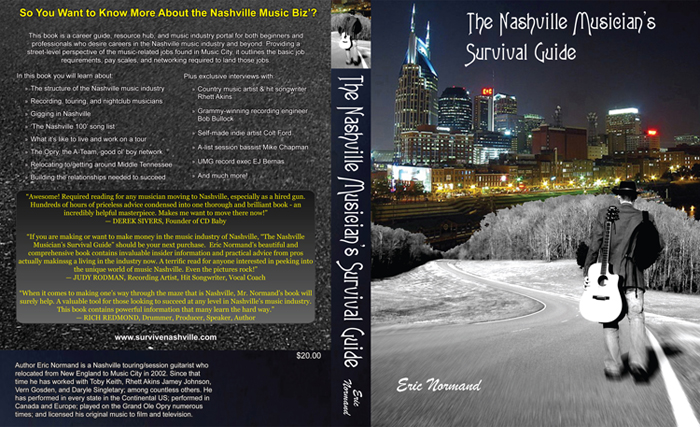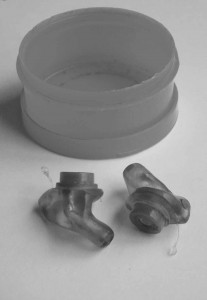
Today marks another milestone in my self-publishing book adventure, that being the arrival of “The Nashville Musician’s Survival Guide” epub and Kindle versions. I am pleased to announce that these digital formats are now available for purchase on my web-store for the low price of $9.99.
While I am still a big fan of old-fashioned paper books, and the original vision of my book was one which was printed on paper, I do see the practicality of eBooks and understand their growing popularity. In this hyper-digital world it comes as no surprise to me that printed books are starting to fall by the wayside, similarly to the demise of CDs, VCR tapes, and newspapers. But I believe there will always be a place for printed books, and therefore my book is available in both print AND electronic versions.
When the printed version of my book was complete I focused on the eBook conversion and hired a company that specializes in this work, eBook Partnership. During this process I learned a lot about the benefits and drawbacks of eBooks.
Here are a few benefits from the reader’s standpoint:
- A person can now carry hundreds of books in one small device.
- They are delivered almost instantaneously.
- They require no packing or shipping expense.
- They can show links, allowing easy access to related information and websites.
- Fonts can be resized to allow easier reading.
A few benefits from the self published author’s standpoint:
- The sale and transaction are instantaneous.
- They require no packing or shipping.
- They’re easier to sell internationally as shipping packages abroad is very expensive.
- They can be more affordable to the masses as they’re typically less expensive than printed books.
- They require essentially no storage space.
It all seems too good to be true, especially from an author’s standpoint. Well after a bit of research I learned that they are just a little too good to be true. Despite all these advantages there are some drawbacks:
- If your battery dies and you aren’t somewhere where you can plug it in your screwed.
- ebooks lack the look and feel of a traditional book – i.e. cover, pages, binding, etc.
- Unlike traditional books there is no market for used eBooks, so a reader can’t recoup some of their original investment.
- And perhaps the biggest drawback from an author’s standpoint is that eBooks lend themselves to piracy.
As we all know, when the music industry went digital, this was the start of the illegal filesharing era. Similarly to the MP3, the eBook is also far more prone to theft than its predecessor, the paper book. As the day on which I would release my own eBook drew near, I started looking into ways to protect my electronic book from piracy. I learned that there are protections that can be applied to my eBook to prevent this kind of theft but this would be expensive, and it would not be foolproof.
The truth is that even Kindle and ePub versions of books with the most advanced piracy protection (like the kind of protection applied to eBooks sold on websites like Amazon and Barnes & Noble) could be disabled by the savvy computer hacker. In other words, if somebody really wants to they can take any eBook, disable its copy protection, and pass it around the Internet as fast as a jar of moonshine will get passed around a Kentucky campfire.
Matt Horner, the eBook designer who worked on my project offered the following thoughts on the matter
“Overall, the value of DRM [Digital Rights Management/Copy Protection] is debatable and anyone who is set on copying your eBook would be able to strip the DRM from it within minutes by downloading free software from the Internet. My advice would be to price your eBook sensibly, accept that there may be some piracy, but assume that the majority of people are honest and would rather buy a reasonably priced eBook than download a pirated copy.”
So I have priced my eBook very reasonably – hence $9.99 (thousands of hours went into this project so I can’t simply offer it for free.) I hope that most musicians, the prime audience for this book, realize that this work has value, similarly to the way a songwriter or artist places value on their work.
So steal it if you must, but if you truly want to help preserve the noble endeavor that being an author or songwriter requires, follow this link and get your copy of “The Nashville Musician’s Survival Guide” today!
Hey everybody, I realize that I haven’t been writing very many blogs over the past couple of months and I feel like I owe y’all a few. This lack of regular blogging is mostly because of the frantic pace I kept while trying to finish the book. I’m going to do my best to put out a new blog everyday (or so) for a while.
When I first moved to Nashville, back in the summer of 2002, I was hungry for work. But gigs, especially gigs that paid well, seemed few and far between. My mentor and friend, “D” gave me tons of good advice, including networking on the town as often as I could. I followed this advice, going out on the town four or five nights a week, taking every oddball gig that was offered, sitting in whenever I could, etc. After six months of this routine, although I was making a lot of friends and connections, I still didn’t have any consistent gigs that paid any real money to speak of.
So one day I told him “Things just don’t seem to be evolving very fast for me. I’m going out on the town all the time, sitting in, making friends and networking, but the phone just isn’t ringing very much. What am I doing wrong?”
His response was quite simple, although I wouldn’t entirely comprehend the entirety of it for a couple of years.
“Patience my boy, Rome wasn’t built in a day. This town goes at its own speed. You’re doing all the right things and making a good impression around town. Everyone I’ve introduced you to likes you and you’re building a good reputation for yourself. The people you are meeting today and the relationships you build with them are what is going to give you work five years from now.”
Although that last statement was probably the most important thing he said during our conversation, the things that I heard the loudest were “This town goes at its own speed,” and “five years.” Geeesh! The Nashville music scene goes in slow motion, and I have to wait five years to get busy – NOT exactly what I wanted to hear!
But looking back at that moment, now going on 10 years into my Nashville life, those telling words make so much sense. I met a lot of people during that first hard year of Nashville – musicians, engineers, songwriters, artists, etc. – and became friends with many of them. In the years that followed, many of these friends and acquaintances would eventually call me for work. Sometimes it was a simple “one-off” gig, other times it was several gigs, sometimes it was songwriter demos.
In 2006 I did a ton of gigs on Broadway, mostly at Tootsies, but also at The Stage and a few other clubs on the strip. It was good supplemental income, good for my chops, and I met and gigged with several great players whom I became good friends with in the years that followed. These gigs all started with one phone call from a guitar player friend I had met during my first couple of months in town. He subbed out a few gigs to me, these gigs led to more gigs, and before I knew it I had all the work I could handle on the strip – All because of one relationship.
Several years later I was working more as a touring musician and no longer gigging regularly downtown. On many occasions I found myself in need of musicians for different situations, and ended up calling players I had met during those earlier years of steady gigging on Broadway. Sometimes I would need a player last minute and call someone I hadn’t even spoken to for a couple of years, someone that had obviously made a good impression at an earlier point in time.
I have learned that the town (and life for that matter) does go at its own speed, and quite often that speed is slower than we would all like. But I have also learned that there really is a lot of truth to “The people you are meeting today and the relationships you build with them are what is going to give you work five years from now.”
As some of you may know, and for those of you who don’t know, I have just released my book “The Nashville Musician’s Survival Guide.” This street-level perspective of the music-related jobs in the Nashville music industry is now available in print version, and the e-book will be available within a few days. To purchase your own copy, follow this link.
It amazes me how every day is so packed full of tasks. As soon as I’m finished with breakfast, I excitedly walk up to my office, sit down at my computer, and dig in to this book project that has all but consumed my life for the past two years. I’m about two days away from sending the finished PDF off to the printer, yet it still seems like it’s never actually going to happen.
Yesterday’s big task was all about finishing the cover design. I had some major help with this all-so crucial and final last step. This help came in the form of the world’s greatest graphic designer (AKA my wife, Kelly). The cover came out great. The front cover art was completed last year, but we still had to design the spine, and the back cover. According to “Dan Poynter’s Self-Publishing Manual,” the back cover is the most important element of your books exterior. For it is the back cover text that will ultimately cause a potential customer to look inside, and hopefully purchase the book, or, put it back on the shelf and pass on it. And of course, it must have a look and feel that makes people want to read it when they pick it up.
We looked at several other books for ideas as a starting point for our cover design. One of them was “I, Alex Cross” by James Patterson, a very cool looking, and eye-catching book exterior. After hours and hours off trial and error, experimenting in Photoshop, etc., we arrived at a finished design that does justice to this manuscript. While the cover concept was completely Kelly’s brainchild, I was the chief laborer in this massive endeavor. Almost every time I had a question, her answer was simply “Google it.” This was not because she didn’t know the answer, but because she knew I was capable of figuring it out myself – and that by figuring it out myself, I would actually learn something:)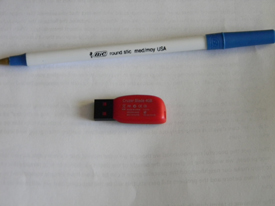
There was one other interesting moment in the last couple of days. Last week I took a flash drive down to Staples and had them print out the entire manuscript on premium copy paper, and then fasten it together with a ring binder. This was so we could give the book one last proof read, check for photo resolution, formatting, etc. (there’s a lot of stress involved when you’re about to spend thousands of dollars to print a book no one has even read yet.) But the funny moment came just before leaving for Staples when I put the flash drive on the kitchen table and made the comment “So there it is, my entire life’s work for the last two years reduced to one, microscopic flash drive, barely the size of a walnut.” It seemed so strange and surreal.
Anyway, just a few more details and I will be done with all the “tasks” required to get this long awaited book out into the world. I really am getting close, but it still seems like I will never finish. Well that’s it for now; got to get back to those tasks …I’ll keep you posted!
If I think back to when I first got out of the Berklee College of Music, back in 1989, I remember feeling excited about all I had learned. My head still spinning from the intense and rapid absorption of so much musical information, I also felt a confidence with this newfound knowledge. As I was a young man in my early 20s, this confidence, at times, perhaps bordered cockiness. But still, I had worked hard at Berklee, gained valuable knowledge about music theory, and was proud of this achievement, eager to share this fact with everyone I knew.
“There is a difference between conceit and confidence. Conceit is bragging about yourself. Confidence means you believe you can get the job done.” – Johnny Unitas
But just because you’re fresh off the Berklee boat doesn’t mean everyone wants to hear you announcing this fact, as I would quickly learn. Right after I got out that spring I replied to a couple of classified ads that were looking for a guitarist. One of the conversations went something like this:
“Hello, this is Charlie.” “Hi, my name is Eric and I just got out of Berklee. I’m calling about the ad for a guitar player.” “Click.” It seems I had no sooner said the word “Berklee” before he was hanging up the phone. What’s up with that?
In the years that would follow, I heard similar stories from others, and would also encounter some folks who seemed to resent me simply because I had this education. I remember one time going to see a rock band in a local bar and enjoying listening to the guitar player, who was someone I knew. When I was chatting with him on a break, I asked him about a certain chord he had played in a blues song. “What was that chord you played in Stormy Monday? I’ve never seen it used before.” “I don’t know. You went to Berklee, you tell me.” Ouch, I was shellshocked! I couldn’t understand this hostility, as I was genuinely curious about what he had been playing.
Perhaps he didn’t know the name of this particular chord and felt embarrassed. Perhaps he wishes he had been able to go to a music college and was simply jealous. Maybe I had bragged too much after getting out of school and was unknowingly being perceived as being cocky, and he simply assumed this was at least partially a result of my Berklee experience. Whatever it was, there was apparently some resentment on his behalf to the fact that I had gone to Berklee.
Of course, I wasn’t entirely innocent in every situation either. I remember sitting in at a blues jam somewhere during that time period. After sitting around all night waiting for my turn to play, when it was finally my turn, I felt compelled to share every note I knew (which was a flurry of modal insanity played in rapid fire succession back then), to perhaps “enlighten” what I perceived as a bunch of simplistic, blues musicians. And then I wondered why I only got to play one song. I’m sure I wasn’t the first young gun fresh out of Berklee to make this mistake.
“Knowledge is power.” – Francis Bacon
That was all a long time ago. During those first years immediately following Berklee, I was still trying to figure out how to apply all that theory to practical, everyday musical situations. Slowly, over time, that knowledge began to morph into my everyday musical applications; it started to really become a part of my being. Eventually, I reached a point where I no longer thought about music theory; I just played and heard music, understanding its technicality on a more subconscious level. As theory and music became one in the same, it got easier to play music.
I never use my Berklee education as a conversation piece, unless asked. If someone asks me about my musical training, I don’t hesitate to tell them I went to Berklee. If they are still interested after I tell them that, I’m genuinely excited to share more. I’m certainly not embarrassed about going to Berklee, I’m quite proud of that accomplishment, even though there is a weird stigma attached to it for some.
“Teachers open the door… You enter by yourself.” – Chinese Proverb
Just because you go to Berklee doesn’t automatically make you a great musician. Are all doctors great just because they went to a great medical school? I think not. The school doesn’t make the doctor great, the doctor has to become great at what he does, the school only serves to get him started.
So maybe that’s part of the reason why there’s a weird stigma attached to “Berklee folk”. It’s a great school, but that doesn’t mean you’re automatically great just because you go there. A great college education is simply a foundation, a starting point. It’s what you do with that education, how responsibly you wield your newfound knowledge, and the persona you exude that will create lasting impressions on those around you.
“You never get a second chance to make a first impression.”
How would you perceive a stranger if the first thing they said to you was “Hi, I’m Joe, I just graduated from Harvard.” Depending on the circumstances, my first reaction could be “What a cocky f@#k!” I’ll be be more likely to like that person if they simply said “Hi, I’m Joe, I just moved to town. Good to meet you.” If someone walks into a room full of people and upon being introduced says “Hi I’m Joe, I just got out of Berklee.” it might come across to some as “Hi, I’m Joe, I just got out of Berklee, and therefore, I’m probably better than you, as many musicians don’t have this level of education.”
You never know what preconceived notions someone might have about a particular music school or other entity. To some, it might be a good thing, but to others, it will instantly bring to mind whatever their preconceived notion might be, and they will instantly associate you with that previous perception, even if it’s incorrect. Don’t give them that opportunity. Let them form their own opinions of you based on a neutral starting point.
So don’t wave your credentials in the face of others, but don’t hide them either. Don’t play every note in your arsenal just because you can. And if you have a music education, whether it’s from Berklee or another college, don’t expect that fact alone to open doors. Knowledge is power, and it will definitely come in handy. But an education doesn’t define people or make them great; it’s simply a foundation that should serve to make them better.
Are you ever in complete silence? During the quietest moments of your life, lying in bed about to fall asleep or sitting alone in a quiet room, can you hear the sound of nothing? I wish I could say I can but I can’t. My ears ring constantly, every second of every day, and it’s been that way for over 10 years now. I have permanent nerve damage in my ears from the result of playing music too loudly for extended periods of time without ear protection. I have tinnitus.
“Tinnitus” is derived from the Latin word tinnire, which means to ring. As stated in Wikipedia, it can be caused by a variety of situations; ranging from exposure to excessive sound pressure levels for extended periods of time, ear infections, foreign objects in the ear, nose allergies that prevent or reduce fluid drain, or wax buildup. But sounds at excessive volume seem to be the most common cause. It is an extremely common condition, affecting as many as 50 million Americans (of which about 12 million have it severe enough to seek medical attention). And sadly, it is a condition for which there is no cure.
“You´re head is humming and it won´t go in case you don´t know…” – Robert Plant – Stairway to Heaven
That’s right, once you have it you will always have it, and it can progress if preventative measures (they’re called earplugs) aren’t taken.
“I have severe hearing damage. It’s manifested itself as tinnitus, ringing in the ears at frequencies that I play guitar. It hurts, it’s painful, and it’s frustrating.” says Pete Townshend. The excessive volume of The Who’s live performances combined with the deafening volume in which he (and John Entwhistle) listened to playbacks through studio headphones has resulted in tinnitus so severe that some reports have said he can’t even hear his phone ring. His affliction with tinnitus has caused him to abandon electric music performance more than once in recent years, rendering it only practical to play acoustic music live, as has also been the case with artists like Neil Young and Bob Dylan.
It’s not just caused by loud music either. It can be caused by any regular prolonged exposure to excessive volume. For instance, many members of our armed forces are exposed to everything from explosions to jet engines and gunfire to loud machinery, one recent article in the New Yorker estimating it affects nearly half the soldiers exposed to blasts in Iraq and Afghanistan.
How much volume can your ears handle?
How many times have you walked into a venue in which a band was playing and thought it was too loud? The human ear was simply not meant to withstand the sound pressure levels produced by megawatt PA systems, electric guitar amps, and even the acoustic, unamplified drum kit in close proximity (especially when played with some conviction). The following chart from the OSHA website shows what is considered permissible noise exposures:
|
Duration per day, in hours |
Sound level in dB* – Decibel level |
|
8 |
90 |
|
6 |
92 |
|
4 |
95 |
|
3 |
97 |
|
2 |
100 |
|
1.5 |
102 |
|
1 |
105 |
|
0.5 |
110 |
|
0.25 or less |
115 |
Your ears can be exposed to sound pressure levels of 90 dB for eight hours, after which point hearing damage can occur. This ratio is a sliding scale, so when the decibels are increased to 110 decibels (the volume of an average rock band), hearing damage can begin to occur in 30 minutes. The louder the SPLs become (sound pressure levels) the less duration your ears can handle.
Decibel Levels of Environmental Sounds (also from the OSHA website)
|
Source–Dangerous Level |
dBA SPL |
|
Produces Pain |
120-140 |
|
Jet Aircraft During Takeoff (at 20 meters) |
130 |
|
Snowmobile |
120 |
|
Rock Concert |
110 |
|
Die Forging Hammer |
100-105 |
|
Home Lawn Mowers |
95 to 100 dB |
|
Semi-trailers (at 20 meters) |
90 |
|
Source– |
dBA SPL |
|
Discomfort Level |
Above 80 |
|
Heavy Traffic |
80 |
|
Automobile (at 20 meters) |
70 |
|
Vacuum Cleaner |
65 |
|
Conversational Speech (at 1 meter) |
60 |
|
Quiet Business Office |
50 |
|
Residential Area at Night |
40 |
|
Whisper, Rustle of Leaves |
20 |
|
Rustle of Leaves |
10 |
|
Threshold of Audibility |
0 |
A friend of mine who lives in New England, one of my former guitar students, recently told me his ears have been ringing for about two years now. He plays in a popular regional jam band on the rise, Superfrog, a spirited group of young players making their mark across the Northeast. As did I in my earlier New England gigging days, they play with an energetic reckless abandon, and they, along with their loyal followers, are living in the magical moments of some of those roaring nightclub dance parties. When he first told me of the recent development of his tinnitus I don’t think he realized the true nature of this beast, how it can slowly progress over many years until it reaches the near unmanageable level of the Pete Townshend’s of the world. Upon discussing it with me he has now decided to invest in some custom musicians ear plugs, with his fellow bandmates also following suit. Some of the other guys in his band don’t have tinnitus yet, and adopting earplugs into their world may ensure they never do.
Living with Tinnitus
“Yes, it’s in my left ear. It’s excruciating…I mean, it’s the worst thing ’cause it’s not…It never…It does go away – it’s not true to say that it doesn’t but, uhh…It doesn’t…The doctors say it won’t…It isn’t actually going away – you’ve just gotta suppress…They try to come to terms with what it actually… Why some people fear it – that’s the psychology behind it. They know it’s there but why is it such a horrible sound? Well, you can say why is a guy scratching at a window with his nails such a horrible sound – I couldn’t put up with that! This is worse!” – Jeff Beck from an MTV interview in June 1993
The thing about tinnitus, and perhaps one of the reasons it’s hard to detect in its earliest stages, is that you don’t notice the ringing all the time, even though it’s always there. It depends on the threshold of the sound around you. If you are on the go from the moment you wake up till the moment you lay down to go to sleep at night, you likely won’t hear the ringing throughout your day, as many of the sounds of everyday life will mask it. It’s the quietest moments when it chooses to show itself. The concept of “masking” is quite useful, if not essential, for many tinnitus sufferers. I have a noise generator beside my bed that plays sounds of the ocean while I sleep. I set it on a volume that is just above the volume of my ringing, and this masks the ring enough for me to fall asleep. Some severely afflicted tinnitus sufferers use portable noise generators or play MP3s of soft music or different types of noise for most of their day, all in an effort to mask the relentless sounds in their head.
Some findings might suggest that avoiding or cutting back on alcohol, caffeine, and salt, among other substances, can help reduce the ringing. As tinnitus is considered partly a subjective condition, it becomes difficult to gauge how different variables affect the level of the ringing. I can’t say that I have personally had any success by adding or omitting any parts of my diet.
Stopping It Cold In Its Tracks
“Later in the evening as you lie awake in bed, with the echo from the amplifiers ringing in your head.”
– Bob Seger – Turn the Page
You can’t get rid of it but you can stop its progression. The one thing that has become completely obvious to me is that earplugs during exposure to loud sounds are ABSOLUTELY ESSENTIAL to prevent the ringing from escalating. I have been wearing custom molded musician’s earplugs, which can be acquired for about $150 with a visit to your local audiologist, for about 12 years now. I wear them not only when performing live with a band, but when mowing the lawn, vacuuming, operating a power saw, anything that causes excessive SPLs. When I’m sleeping on a tour bus, I sleep with foam earplugs to cut down on the rumble of the road. If I fly, I wear earplugs the whole time on the plane.
I’ve also learned how to turn down my music a bit. I’ve experimented with using less powerful guitar amps, speaker attenuators, and drummers that don’t “bash” quite so much. I’m cautious when recording with headphones as well, watching the volume and taking breaks often.
I urge everyone to heed this message. If you play loud music regularly, either live or in the studio, consider the earplugs option, it will be the best $150 you’ll ever spend on gear. And think about your audience too. Are you blowing them out of the room with your guitar amp, lead vocal, or snare drum? Is your band louder than it needs to be to get its point across? Are your ears ringing regularly from your construction job or your job at the airport? Are your kids listening to iPods on 11 all day long? If you think the answer might be yes to any of these, don’t wait until it’s too late to become proactive. Act now or you might wind up hearing the sound of a continual dog whistle for the rest of your life.
So when you have a quiet moment, ask yourself, your family, and your friends this one simple question –
Do you ever hear the sound of true silence?
The names of some of the musicians in this story have been changed to protect the innocent guilty.
I first arrived to my new home in Gallatin, TN, some 30 miles north of Nashville on a warm summer night in June of 2002. My family and I had just spent two days driving across the country with all of our personal belongings stuffed into the back of a rented Ryder truck and, despite being exhausted, we unloaded the truck at about 8 PM before collapsing into a deep sleep. All I knew about this new world called Nashville was the vague description of a gigantic music community conveyed by my friend “D”, a world which I knew little about, but one I needed to explore quickly. While we did have some savings, employment was a priority, so after a day of unpacking, we ate dinner, took showers, and headed for the city to start getting acclimated.
At some point during the drive in we stopped and picked up a copy of “The Scene”, Nashville’s biggest arts and entertainment newspaper. The words “Open Blues Jam 9 to 1 at The French Quarter” seemed to be calling my name from a section of club listings, and that would be our first stop. We walked into the dimly lit room to see a crowd of 10 or 12 listening to a four piece band meandering through some blues standards. After a while they called me up and, not knowing a soul in the place, I played two or three songs which, to my relief, were well received. Upon returning to my table, a moderately well dressed gentleman approached me and said “Hi, my name is Freddie. I really enjoyed your playing. I’ve got my own band and we are in need of a guitar player. Are you looking for a gig?”
I couldn’t believe what I was hearing. Fresh off the boat and without a job in site, this seemed too good to be true. Now keep in mind that I still didn’t know how the Nashville music scene or community worked, so any gig being offered seemed like a good thing. “Yeah, I’m definitely interested in doing some gigs.” And with that we exchanged phone numbers. Of course I would later learn that in Nashville not all gigs are created equal (more on that later). After chatting with Freddie for a while the next day I accepted his three or four upcoming local gigs and agreed to attend a few rehearsals with his band to prepare. The next day I met him at a Mini Mart where he gave me a CD of his material. Always wanting to be prepared, I went home and anxiously dug in. This was where I would receive my first surprise.
After popping the disc into my CD player I began to listen to a marginal recording of my new “band” and was a bit disappointed. The songs weren’t all that great, the musicianship was average at best, and the vocals were downright scary. “Well, maybe they’ll sound a little better live.” my wife, Kelly, optimistically encouraged. I learned the stuff and showed up for my first rehearsal at Freddie’s home south of Nashville, guitar and amp and hand. Shortly after rehearsal began it became apparent to me that the level of musicianship in this band was unlike what I had previously heard at the Fiddle and Steel and other clubs around town when visiting the city a few months prior. And when I say “unlike” I don’t mean in a good way. Again, I chalked it up as “Maybe they’re holding back because it’s a rehearsal and will sound better live.” Of course in hindsight, I should have known better, but hey, I was new to town and just happy to have some gigs lined up.
That brings us to our first gig a couple of weeks and uninspired rehearsals later (and by the way, I did get paid something like $15 per rehearsal for gas money). The Radio City Café is a small, but friendly bar somewhere on the east side of the city, and while being inside the club itself felt fairly safe, the surrounding neighborhood streets did not. The other band guys were already there and, running a little late due to getting lost in this still unfamiliar city, I quickly set up my gear after a brief reprimand from Freddie for my tardiness. Then Freddie said “Okay everybody, let’s have our preshow band meeting backstage.” We followed Freddie to the “backstage“ area (otherwise known as the kitchen of this fine establishment) to engage in Freddie’s little pep rally. “Okay everybody, we’re going to play the first two songs back to back and then I’ll address the crowd. We’ll play the third song and then I’m going to tell a joke. At the end of the joke I want you (points at drummer) to play a little ‘ba dat boom’ you know, like they sometimes do on the late show. Keep an eye on your set lists, I’ve made notes where I’m going to pause to speak and tell jokes.” Oookaaay. “And one more thing, I want everybody to walk out onto the stage in the right order, in other words, Joe, because you’re on the furthest side of the stage you should go first.”
This all seemed a little overproduced and over-the-top for the gig at hand, but hey, you can’t fault the guy for taking this $20 dive gig in East Nashville as serious as a show at the MGM Grand. To become successful, one must project a successful image at all times, right? So we walked out onto the stage single file and barreled through the first two poorly written blues numbers, after which, the audience of my wife plus 12 went mild. Freddie introduced himself and we played the third number which was followed by his first joke. While I can’t remember the specifics of the joke, I do remember that it was long, rambling, and not the least bit funny to me or anyone else in the place. The drummer’s “ba dat boom” didn’t help much either. We dug back into a couple of more songs which, unfortunately, were also played with no more power or conviction then the weak renditions we had limped through at the rehearsals. So this was the show, we would play a couple of uninspired songs, then Freddie would tell a bad joke, a couple more songs, more bad jokes. The jokes were so bad that, after a while, you could hear groans from the crowd as soon as they realized he was going to tell one.
Still, bad jokes and all, I did manage to have some fun, after all, I was now playing in Nashville so I was pretty excited because of that fact alone. Plus, sometimes when you’re playing with a band on stage it’s hard to be objective about the overall situation. I finished out the night, loaded out my gear, got paid my $20 and hopped in the car with Kelly for the 45 minute drive home. The gig had been awkward and we began the drive with a deafening silence which I bravely interrupted by asking “So what did you think?” “Well, you were good. Freddie, not so good. He can’t sing very good, the songs are terrible, and his jokes are downright painful. The drummer was pretty bad as well.” she answered honestly. “Yeah, I was kind of afraid that’s what you’re gonna say. I guess I’ll give it one more shot.”
That one more shot turned out to be a gig back at the French Quarter a couple weeks later. It just so happened that on the night of this gig my friend “D” was playing the Opry and had invited Kelly to go along, so she didn’t arrive at my gig until near the end of the show. She didn’t miss much. While they were getting the royal treatment on the other side of town, I was living a nightmare that was literally an exact duplicate of my first gig with Freddie, only in a nicer club. I mean, it was carbon copy, the same preshow meeting, single file onto the stage, same type of milk toast performance, same bad jokes, same “ba dat boom” following the same bad jokes. Oh yes, there were a few subtle differences; this club, despite being considerably larger than the Radio City Café, had an even smaller crowd (I think six was the magic number on this night), it was in an even scarier part of town, and it had a great PA system which allowed every nuance of Freddie’s bad vocals and jokes to be heard with exceptional clarity. By this point in time Kelly and I had more thoroughly explored the Nashville club scene and had a better idea of what kinds of musical situations might lead somewhere. It was now obvious that this situation wasn’t heading in a very good direction. So by the time I was walking to my car and Freddie approached me I was basically ready to give my notice.
Then comes one last surprise. “I need $20 to pay for house sound.” He states matter-of-factly. “What? I thought you were walking out to pay me.” “No, I can’t pay you on this gig. To play here, we have to pay a house sound fee of $100, that’s 20 bucks each.” My look of confusion might have caused him to rethink his strategy and he then blurted out “I’ll tell you what, instead of paying you for the next rehearsal, I’ll just put that money towards the sound fee.” He offered. “That would be great Freddie.” and with that, we drove off, laughing all the way to the poorhouse. I called him the next day and told him that I appreciated him giving me a chance, but his band just wasn’t right for me at this point in time. I had given it my all, and while the music had been largely uninspired, it was the bad jokes that were killing me. I literally could not take one more night of those bad jokes. It was time to see what else this town had to offer.
After spending my first 35 years living in New England, getting used to the humid subtropical climate of Nashville took some effort. Compared to middle Tennessee, spring through fall in the Northeast is quite mild, while the dreaded winter months have often been compared to those of Canada or Siberia. Those brutally cold and frigid winters can sometimes begin as early as mid-October and last all the way through April on some years. Snowstorms, ice storms, daily high temperatures in the 20s, teens, or less, and brutal nor’easter’s are often daily occurrences for months on end. And then finally, the snow starts to melt, the birds return, the trees begin to grow leaves again, and spring is upon us. Of course Spring can also be a cold wash out with temperatures only reaching the 50s accompanied by the kind of rainfall that could rival Seattle. On years where this happens, it seems like it goes straight from winter to summer. I used to think, before I 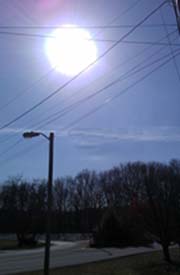 lived in the South, that New England summers could get too hot, but in hindsight I was just being a baby. How I long for those pussified summers now. Fall in New England is arguably the best weather of the year. Cool, dry, great weather to be outdoors.
lived in the South, that New England summers could get too hot, but in hindsight I was just being a baby. How I long for those pussified summers now. Fall in New England is arguably the best weather of the year. Cool, dry, great weather to be outdoors.
That’s all behind me now. For the climate of Nashville, my new home, is radically different, and one that requires a whole new mindset. The winters in Nashville, if you want to call them that, are almost more like spring in New England. While it can get cold, occasionally getting down into the teens or low 20s, it is not uncommon to have several warm sunny days in each of the winter months, temperatures sometimes even climbing into the 70s. It might snow once or twice, maybe an ice storm or two, some rain, but in general I find these winters very livable compared to those of my New England years. Spring can be real nice temperature wise, but this is also our primary tornado season and, after this year, flood season. This brings us to summer, or as I call it, hell on earth. Beginning in June, or sometimes as early as mid-May, it’s 90° plus and humid every day for what seems like an eternity, typically all the way through September. Some get used to this heat and humidity but I can’t stand it, to me this is a New England winter in reverse.
During the cold wet winter months of New England, outdoor activities all but grind to a halt (except of course for those who love to ski or snowmobile). In general, except for commuting to work, most New Englanders stay indoors during this time of year, waiting for it to warm up a bit to resume outdoor activities. Now that I live in Nashville this is how I approach summer. In general, it’s just too hot and humid for me to enjoy the outdoors during this time of year, and I find myself waiting for it to end so I can again enjoy the outdoors on a regular basis. I literally get cabin fever during the summer. But then it finally ends with the onset of fall, my favorite time of year here, by early to mid October. Of course we have to be on our toes in November for our secondary tornado season.
So I don’t know if it’s just me or if other transplants feel this way, but as far as the climate of middle Tennessee goes – Fall is great, Winter is palatable, Spring can be hairy, but Summer just plain sucks. I’m glad it’s finally over.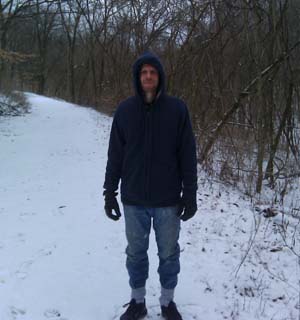
In this day and age, looking the part is often just as important as playing the parts for many professional musicians. This is equally important for those who have not yet achieved a career in music, but are working towards one. While being proficient on your instrument and possessing good social and networking skills are obviously important, in the world of live music performance, your appearance can sometimes be a deciding factor on getting the gig.
It’s easy to find the right clothes, and it’s a well-known fact that working out and having a good physique will make those close “hang well” on your frame. But for some (men especially), the hairstyle, or lack thereof, can be a dealbreaker. I’m not talking about the 20 something’s with the $300 spiky mod looking haircuts. As much as I don’t care for that look, they are not the biggest offenders of the modern day hair wars. In my opinion, it’s the guys who are losing their hair but living in denial that really need to rethink the current state of the top of their heads.
It’s no secret that many of us have lost, are losing, or will lose much our hair over the course of our lives. For some it begins as early as late teens or early 20s, for others it might not happen until they’re in their 30s or 40s, while others manage to hold on to most of their mop 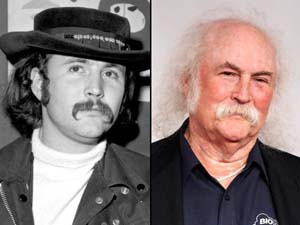 until old age. Sometimes this hair loss happens rapidly, over several months or a couple of years and sometimes it can occur very slowly and gradually over decades. Some just get a little bald patch near the back of our head, while others are stricken with more of that dreaded “parting of the seas” look.
until old age. Sometimes this hair loss happens rapidly, over several months or a couple of years and sometimes it can occur very slowly and gradually over decades. Some just get a little bald patch near the back of our head, while others are stricken with more of that dreaded “parting of the seas” look.
Many musicians take great pride in their hair, often choosing a style that works for them in their younger years and sticking with that as they age. Some will sport short to medium length do’s while others choose to wear it long, anywhere from the mid-60s Beatles look all the way to full-blown hippie length. But if you are in the unlucky category that many of us fall into, that being the permanent hair loss club, these styles will begin to create a different effect and take on new meanings as these 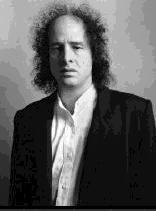 hair follicles slowly begin to vanish forever.
hair follicles slowly begin to vanish forever.
Are you the guy with the comb-over? If you are, you’re not fooling anyone. Maybe you’re the guy that had hair like Greg Allman when you were in your 20s. Oh, how the girls loved it back then. But how are you being perceived now when that part between you’re neatly combed and blowdried shoulder length blond hair rival’s the San Andrea’s fault? Probably more like the friendly lion in the wonderful Wizard of Oz. There’s always a baseball cap. But eventually, as people notice over time that you’re never seen without one, it will become a dead giveaway that you’re hiding something. You could always grow a beard and start wearing a cowboy hat, sporting your version of some kind of half assed Travis Tritt look, but that’s a pretty big commitment, and not that hip anyway. Not to mention, when you commit to the whole hat thing, what happens when you go swimming? What happens the first time you sleep with a new girlfriend?
Face it, none of this works. Yet, somehow, we see people that look like this all the time. Well I have some 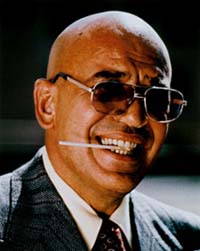 great news for all of you who are fighting this futile “battle of the bald”. There is a way out, and I’m not talking about hair transplants, wigs, or toupe’s. Just let it go. That’s right, shave it off. Bald is beautiful, baby. For proof, look no further than Telly Savalas or Bruce Willis.
great news for all of you who are fighting this futile “battle of the bald”. There is a way out, and I’m not talking about hair transplants, wigs, or toupe’s. Just let it go. That’s right, shave it off. Bald is beautiful, baby. For proof, look no further than Telly Savalas or Bruce Willis.
Growing up, I had a thick head of hair, and by the time I was 15 had already experimented with growing it long. I went in and out of short hair and long hair mode for a few years before going all out in the late 80s, when I began sporting a full-blown Richard Marx style mullet. Of course, at that moment in time that style was in, so spending 20 minutes with a can of moose and a blow dryer to get ready to go out for the night, or gig, was completely natural. Of course I kept this “helmet do” well into the 90s, long after it had become unfashionable. Then, in my mid-20s, it all started going quite badly.
Over a period of about a year, I lost most of the hair in the middle of my head. It happened so quickly that I hardly even noticed at first. But then when my girlfriend started telling me that I was beginning to look like Michael Bolton, I knew something was wrong. On a bad day, my massive bouffant do, once reminiscent of Peter Frampton’s early look, began to look more like that of the comedian, Gallagher. Comments like “Here comes Billy Crystal” or “Is that Stephen Wright?” and even “When did David Crosby lose all that weight?” also caused much embarrassment. So I began a slow transformation. I attempted to minimize my baldness by wearing hats, doo-rags, even at times pulling it back into a ponytail. But ultimately, this wasn’t working. Half the time it just looked bad.
So finally, around the year 2000, I took it down to a fairly short length, just an inch or so on top. It was better than having “Gallagher syndrome”, but still not quite right. Shaving it down to the scalp was the only thing left to try. At first, I was horrified at the thought of doing this, but with a little prodding from my wife, I went for it. Boy am I glad I did. I instantly realized that bald works for me. Having a bunch of hair on the sides with the bald spot in the middle was simply drawing attention to the fact that I was balding. Lose all that hair, and you create the perception that you are bald by choice, not because of nature. In other words, nobody can tell that all your 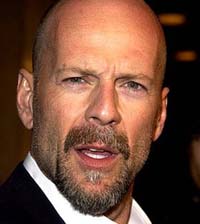 hair fell out. Now when I look in the mirror, I feel younger.
hair fell out. Now when I look in the mirror, I feel younger.
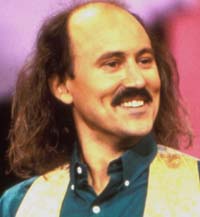 Plus there are many added benefits. Showers now take five minutes. I save a small fortune on shampoo and conditioner and haven’t bought a comb or a hair brush in decades. Getting ready to go to work or out on the town now only takes seconds. It’s harder to get dandruff, and my head is now essentially “lice-proof”. But most important of all, I no longer look like an idiot.
Plus there are many added benefits. Showers now take five minutes. I save a small fortune on shampoo and conditioner and haven’t bought a comb or a hair brush in decades. Getting ready to go to work or out on the town now only takes seconds. It’s harder to get dandruff, and my head is now essentially “lice-proof”. But most important of all, I no longer look like an idiot.
So which guy are you? Are you still clinging to the past, or have you embraced your inner baldness? Whose look do you relate to more, Stephen Gallagher or Bruce Willis? It’s not too late to save yourself. So what are you waiting for, get out those clippers and get busy!
The other day I was answering a questionaire for author, Wendy Willis’ upcoming book ‘Making It In Nashville‘ when one of the questions created a moment of pause – “What or who did you have to leave in order to chase your Nashville dreams?” The question was harder to answer than you might think and allowed for a great deal of reflection. As this factor is often underestimated if not ignored by those considering relocation to Nashville, I felt it was worthy of a post here.
The old saying “You never know what you have until it’s gone” is so true, and one that me and my family have come to fully understand upon relocating to Nashville. Shortly after I left my native homeland of New England I remember thinking “I’ll still be able to come home and visit once in a while. And of course I can always just call my friends and family on the phone when I miss them.” While initially this sounded like a good plan, the reality is that once you move 1300 miles away from your home, regular visits become impractical. And once those closest to you are no longer a part of your daily routines, some of these relationships can slowly begin to fragment.
Who did I have to leave to chase my Nashville dreams? When I left New England I left behind about 40 guitar students, many of whom I had been teaching for years and had become good friends. My parents and direct family, friends I had grown up with, people I played in bands with, and my wife and son’s family and friends were also rendered to essentially telephone and e-mail correspondence. You never realize how much you’ll miss these people until some time passes. Even though I do still keep in touch with my old friends and family, it’s still tough. In spite of the occasional visit back home, it’s almost as if many of them were part of another life.
What did I leave behind to chase my Nashville dreams? – Comfort, stability, my teaching career, my peers, my career as a nightclub musician, a familiar way of life, almost every relationship that ever meant anything to me, a 10 minute drive to the ocean, and all the familiar landmarks and places I had seen daily for 33 years. I also left behind harsh winters, as many bad habits as I could, and a music scene in which I could not find fulfillment. (In hindsight this lack of ‘fulfillment’ might actually have been more related to how I perceived myself than any fault of the music scene.)
The passage of time does change one’s perspective on life. It’s taken me almost a decade of working in Nashville to realize that I took a lot of things for granted in my earlier life. Nashville is a massive music industry full of opportunities that can’t be found elsewhere. While this is a good thing in some ways, it also creates an atmosphere of extreme competition, and a social atmosphere I often call ‘the land of the permanent job interview’. It wasn’t like that back home, and sometimes I miss that more carefree musical atmosphere. Most people in the Nashville music industry have an agenda and this can make it harder to find ‘real friends’. Sometimes I find myself yearning for the past, where genuine and deep relationships were more obvious.
While adjusting to the absence of all things familiar has been difficult, and I do miss my old life and friends, I am still glad I made this move. The journey has been far and wide, a life-changing experience that has taken me down many unsuspecting roads. Had I not embarked on this journey, I would not be the person I am today.
Anyone who has ever gigged in Nashville knows that it is hard to make any real money by playing in the clubs around town. Aside from a very small handful of gigs that might pay $75-$100 per player, most offer minimal to no pay – some offering a base pay $20 to $30 plus tips, a lot more offer tips only (which often means essentially playing for free), and a few are even pay to play. Even on the base pay plus tips gigs quite often a player will only take home $25 or $30.
So from time to time the “playing for free” debate rears up in conversations. Some say that performing music in public for free is the only way they can gain experience, obtain exposure, make connections, and have any sort of musical life beyond practicing in the basement. Others claim that playing for free makes it harder to receive fair (or any) compensation for their services. Why would clubs and venues pay for bands and players if most will do it for free?
While both are legitimate arguments, to understand why things are the way they are I think it is important to consider the overall role of music and musical performers throughout history, not just in today’s world.
Daniel Levitin, in his book “This Is Your Brain on Music” talks about music being at the heart of human evolution.
“No known human culture now or anytime in the recorded past lacked music. Some of the oldest physical artifacts found in human and protohuman excavation sites are musical instruments.”
He continues
Even more so in non-industrialized cultures than in modern Western societies, music is and was a part of the fabric of everyday life. Only relatively recently in our own culture, 500 years or so ago, did a distinction arise that cut society in two, forming separate classes of music performers and music listeners. Throughout most of the world and for most of human history, music making was as natural an activity as breathing and walking, and everyone participated. Concert halls, dedicated to the performance of music, arose only in the last several centuries.
With that, I state my case that music has always been there and is an important and crucial part of our being. It is perhaps the earliest form of communication. Somewhere along the way this art form, this way of life, morphed into a product, or a commodity.
In the book “Muse Power: How Recreational Musicmaking Heals Depression and Other Symptoms of Modern Culture” by Cheri D. Lunn writes:
Prior to the 20th century, the concept of selling music wasn’t really commonplace. One of the very first to consider music as a marketable commodity, was Wolfgang Amadeus Mozart. “In the mid-to-late 1700s, performers and composers such as Wolfgang Amadeus Mozart began to seek commercial opportunities to market their music and performances to the general public.” (5 Wikipedia /Dear Constanze The Guardian) Before that, in more traditional cultures, the Griots, bards, and musicians were cared for by their communities, as equals in the tribe doing their part to contribute. In Europe, up until the 1700’s music was supported by patronage from the aristocracy, or the church, and so there was no need for artists to sell themselves; and so the concept of selling music had just not yet come to be.
A crucial change in the history of folk music began during the twentieth century with folk artists adopting the very western concept of “marketing for money,” or “selling” the music of the people. In this time, a new genre of popular music arose that basically became an imitation to the original traditions of folk music as it was sung by ordinary people. These “folk” artists marketed themselves alongside more popular and modern emerging artists and created a niche for themselves by performing traditional music and songs in amplified concerts, and disseminating their work by recordings and broadcasting.
But along with the commercialization of music and musical performers, especially now in the digital age, comes somewhat of a desensitization to music, or what I call a ‘dumbing down’ of the masses in this regard. In today’s world, music is heard everywhere – from traditional advertising like TV and radio commercials to ring tones and ring backs, from video games to iPods, today’s Internet generation is saturated with digital music overload. In many situations, recorded music is now free, and with the advent of software like garage band, millions can now make homemade recordings to further flood the airwaves. In the midst of this oversaturation, TV shows like “American Idol”, “Nashville Star”, and “America’s Got Talent” have perpetuated the false reality that the masses can also now obtain superstardom.
Put all this together, and you’ve got more people than ever trying to get into the “music business”. But as millions more each year try to enter this world, the opportunities for them will inevitably shrink. There are only so many bars and nightclubs that need live music.
If you consider this history, it is fair to say that the concept of being paid for your music, or paid to play your music, is relatively new and largely an invention of our modern capitalistic society. Don’t get me wrong, I’m not suggesting we abandon this concept, this is how I am currently earning the bulk of my living. What I am suggesting is that the evolution of the paid musical performer may have been accidental, and is not necessarily a sustainable vocation in this modern world.
Music belongs to everybody. We need to better understand the role that music has played in our history, and how the cultivation of music as a part of our culture can benefit our world as well as the futures of our children. Does our future hold a world in which musical performers are paid for their ‘services’, or will the performance of music one day return to something that is shared by everybody? Did society really benefit when music was turned into a product? Do we deserve to be “paid to play”? I don’t know if I’ll always be able to earn a living from music, but even if one day I can’t, I’ll always play music, doing so enriches my life.
What is music, and the art of performing it worth to you?
